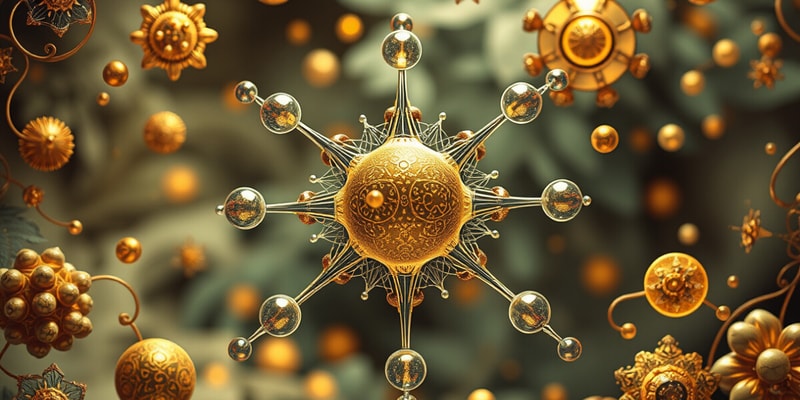Podcast Beta
Questions and Answers
What is the primary role of chemistry in understanding and shaping the world around us?
Which of the following best describes the structure of an atom?
Which type of chemical bond is formed between oppositely charged ions?
What is the purpose of balanced chemical equations?
Signup and view all the answers
Which of the following industries does the passage specifically mention as a practical application of chemistry?
Signup and view all the answers
Which of the following is NOT an example of a current research topic in chemistry?
Signup and view all the answers
What is the primary goal of green chemistry as mentioned in the text?
Signup and view all the answers
Which of the following statements about organometallic chemistry is true based on the information provided?
Signup and view all the answers
Which of the following is NOT a potential application of supramolecular chemistry?
Signup and view all the answers
Which of the following statements accurately summarizes the role of chemistry in addressing societal needs, according to the text?
Signup and view all the answers
Study Notes
Introduction
Chemistry is the scientific discipline concerned with the study of matter and the changes it can undergo. As the basis of modern industrial processes, chemistry plays a vital role in understanding and shaping the world around us. This article explores the fundamental principles of chemistry, its impact on society, and current research developments.
Principles of Chemistry
Atoms are the building blocks of all matter. An atom consists of protons, neutrons, and electrons organized into shells. Protons and neutrons reside in the nucleus at the center of the atom, while electrons orbit around the nucleus in specific energy levels. The number of protons determines the element, while the number of neutrons and electrons affects the isotope and charge, respectively.
Elements combine in various ratios through chemical bonds to form compounds. Ionic bonds occur between oppositely charged ions, while covalent bonds involve sharing electrons between nonmetal atoms. Metallic bonds form between metal atoms, where delocalized electrons are shared among many atoms.
Reactions between elements and compounds follow certain rules based on conservation of mass and charge. Balanced equations represent the stoichiometry of reactants and products, allowing for quantitative predictions of reaction outcomes.
Applications of Chemistry
Chemistry has numerous practical applications across industries, such as medicine, agriculture, materials science, and energy production. For example, pharmaceuticals improve health and treat diseases, agricultural chemistry enhances crop yields and nutritional value, and materials chemistry develops advanced materials for construction, electronics, and aerospace. Energy chemistry focuses on renewable sources and sustainable technologies, addressing climate change and resource scarcity challenges.
Current Research in Chemistry
Researchers continue to push boundaries in chemistry, exploring novel areas and refining existing knowledge. Some current topics include:
-
Green chemistry: Focusing on reducing waste, pollution, and toxicity in chemical processes, aiming for environmentally benign solutions.
-
Organometallic chemistry: Studying the interactions between organometallic compounds, often involving transition metals in complex structures.
-
Supramolecular chemistry: Investigating self-assembling units that interact without forming strong covalent bonds, leading to supramolecular architectures with potential technological applications.
-
Neurotransmitter receptors: Exploring the molecular mechanisms of chemical signaling in the brain to address neurological disorders.
-
Bioinspired materials: Designing new materials based on biological processes, such as mimicking natural adhesives or harnessing enzymatic catalysis for industrial applications.
Conclusion
Chemistry is an essential scientific discipline that underpins our understanding of matter and its transformations. With a rich history of discoveries and ever-evolving research frontiers, chemistry continues to shape our world through its impact on various industries and societal needs. As we continue to explore the fundamental principles and push the boundaries of known chemical phenomena, the potential for novel breakthroughs in material science, energy production, and healthcare remains vast.
Studying That Suits You
Use AI to generate personalized quizzes and flashcards to suit your learning preferences.
Description
Test your knowledge on the basic principles, applications, and current research areas in the field of chemistry. This quiz covers topics such as atoms, chemical bonds, reactions, practical applications in various industries, and cutting-edge research in green chemistry, organometallic chemistry, supramolecular chemistry, and bioinspired materials.




